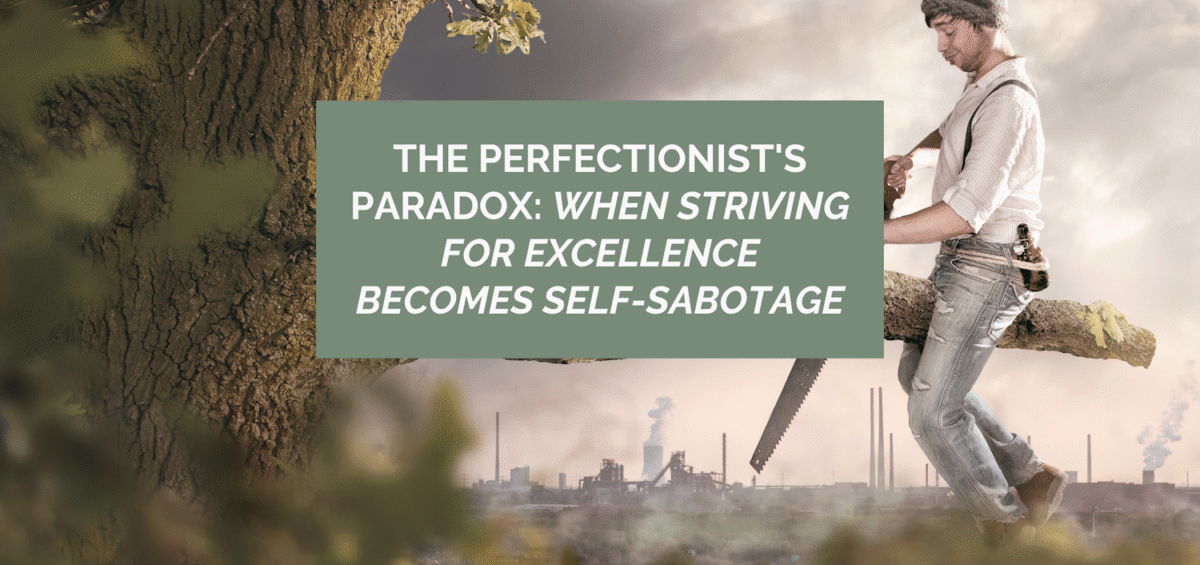Story time…Sarah is a high-achieving professional who prides herself on delivering flawless work. She spends hours perfecting every email, often missing deadlines because nothing feels quite good enough. Despite her obvious intelligence and capability, she frequently feels like a fraud, convinced that one mistake will expose her as incompetent. Sound familiar? Sarah is caught in what I call the perfectionist’s paradox, the way that striving for perfection can undermine the very excellence it seeks to achieve.
Perfectionism gets a lot of positive press in our achievement-oriented culture. We admire people with “high standards” and celebrate those who “refuse to settle for mediocrity.” But there’s a crucial difference between healthy striving for excellence and perfectionism, and understanding this difference can be life-changing for high achievers who find themselves stuck, anxious, or burning out despite their success.
The hidden costs of perfectionism
True perfectionism isn’t just about having high standards, it’s about setting standards that are impossible to meet consistently, then basing your self-worth on meeting them anyway. Perfectionists often believe that anything less than perfect is failure, that mistakes reflect fundamental character flaws, and that their value as a person depends on their performance.
This mindset creates several problems that actually interfere with peak performance. First, it generates chronic anxiety. When your self-worth is constantly on the line, your nervous system stays in a state of hypervigilance that makes it harder to think clearly, be creative, or perform under pressure. Second, perfectionism leads to procrastination and avoidance. When the stakes feel impossibly high, it becomes easier to delay starting than to risk producing something imperfect. Third, it creates an all-or-nothing mentality that makes it difficult to learn from feedback or bounce back from setbacks.
The neuroscience of perfectionist anxiety
When perfectionist thoughts activate our brain’s threat detection system, several things happen that actually impair performance. Our prefrontal cortex, responsible for complex decision-making and creative problem-solving, gets less blood flow as our brain diverts resources to deal with the perceived threat. Our attention narrows, making it harder to see the big picture or notice opportunities. Our memory consolidation becomes impaired, making it harder to learn from experiences.
In sports and performance psychology, we see this clearly with athletes who choke under pressure. The perfectionist athlete who can’t tolerate making mistakes often ends up making more mistakes because their fear creates the very tension and overthinking that disrupts automatic, skilled performance. The same principle applies in any high-performance context.
Excellence versus perfectionism
Healthy excellence-seeking is characterised by high standards that are challenging but achievable, motivation that comes from internal satisfaction and growth, and the ability to learn from mistakes without catastrophising. Excellent performers focus on the process rather than just outcomes, view setbacks as information rather than indictments, and maintain their sense of self-worth independent of their performance.
Perfectionism, by contrast, sets standards that are often unrealistic, derives motivation from fear of failure rather than love of the activity, and views any mistake as evidence of fundamental inadequacy. Perfectionists focus obsessively on outcomes, interpret setbacks as confirmation of their worst fears about themselves, and tie their identity so tightly to their performance that any failure feels existential.
Breaking free from the paradox
The path out of perfectionism isn’t about lowering your standards, it’s about developing a more sustainable and effective relationship with excellence. This involves learning to set challenging but realistic goals, developing tolerance for the discomfort of imperfection, and finding ways to maintain motivation that don’t depend on being flawless.
One of the most powerful shifts perfectionists can make is learning to distinguish between their performance and their worth as a person. This doesn’t happen overnight; it takes time and work.
The irony is that when people begin to release their grip on perfectionism, their actual performance often improves. They become more creative, more willing to take productive risks, more resilient in the face of setbacks, and paradoxically, more likely to achieve the excellence they were striving for all along. Sometimes the best way to get what you want is to stop needing it so desperately.
Written by Psychologist Eleanor












Leave a Comment